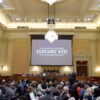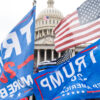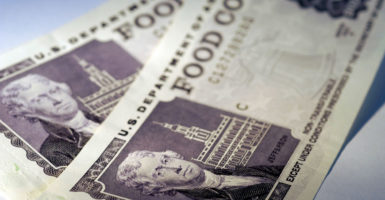Mamaw encouraged me to get a job—she told me that it would be good for me and that I needed to learn the value of a dollar. When her encouragement fell on deaf ears, she then demanded that I get a job, and so I did, as a cashier at Dillman’s, a local grocery store.
Working as a cashier turned me into an amateur sociologist. A frenetic stress animated so many of our customers. One of our neighbors would walk in and yell at me for the smallest of transgressions—not smiling at her, or bagging the groceries too heavy one day or too light the next. Some came into the store in a hurry, pacing between aisles, looking frantically for a particular item. But others waded through the aisles deliberately, carefully marking each item off of their list.
>>> Read J.D. Vance’s introductory essay in The Heritage Foundation’s 2017 Index of Culture and Opportunity.
Some folks purchased a lot of canned and frozen food, while others consistently arrived at the checkout counter with carts piled high with fresh produce.
The more harried a customer, the more they purchased precooked or frozen food, the more likely they were to be poor. And I knew they were poor because of the clothes they wore or because they purchased their food with food stamps. After a few months, I came home and asked Mamaw why only poor people bought baby formula. “Don’t rich people have babies, too?” Mamaw had no answers, and it would be many years before I learned that rich folks are considerably more likely to breast-feed their children.
As my job taught me a little more about America’s class divide, it also imbued me with a bit of resentment, directed toward both the wealthy and my own kind.
The owners of Dillman’s were old-fashioned, so they allowed people with good credit to run grocery tabs, some of which surpassed a thousand dollars. I knew that if any of my relatives walked in and ran up a bill of over a thousand dollars, they’d be asked to pay immediately. I hated the feeling that my boss counted my people as less trustworthy than those who took their groceries home in a Cadillac. But I got over it: One day, I told myself, I’ll have my own d–ned tab.
I also learned how people gamed the welfare system. They’d buy two dozen packs of soda with food stamps and then sell them at a discount for cash. They’d ring up their orders separately, buying food with food stamps, and beer, wine, and cigarettes with cash. They’d regularly go through the checkout line speaking on their cell phones. I could never understand why our lives felt like a struggle while those living off of government largesse enjoyed trinkets that I only dreamed about.
Mamaw listened intently to my experiences at Dillman’s. We began to view much of our fellow working class with mistrust. Most of us were struggling to get by, but we made do, worked hard, and hoped for a better life. But a large minority was content to live off the dole.
Every two weeks, I’d get a small paycheck and notice the line where federal and state income taxes were deducted from my wages. At least as often, our drug-addict neighbor would buy T-bone steaks, which I was too poor to buy for myself but was forced by Uncle Sam to buy for someone else. This was my mindset when I was seventeen, and though I’m far less angry today than I was then, it was my first indication that the policies of Mamaw’s “party of the working man”—the Democrats—weren’t all they were cracked up to be.
Political scientists have spent millions of words trying to explain how Appalachia and the South went from staunchly Democratic to staunchly Republican in less than a generation.
Some blame race relations and the Democratic Party’s embrace of the civil rights movement. Others cite religious faith and the hold that social conservatism has on evangelicals in that region.
A big part of the explanation lies in the fact that many in the white working class saw precisely what I did, working at Dillman’s. As far back as the 1970s, the white working class began to turn to Richard Nixon because of a perception that, as one man put it, government was “payin’ people who are on welfare today doin’ nothin’! They’re laughin’ at our society! And we’re all hardworkin’ people and we’re gettin’ laughed at for workin’ every day!”
This is an excerpt from “Hillbilly Elegy” by J.D. Vance. Copyright © 2016. Reprinted courtesy of Harper, an imprint of HarperCollins Publishers.



























